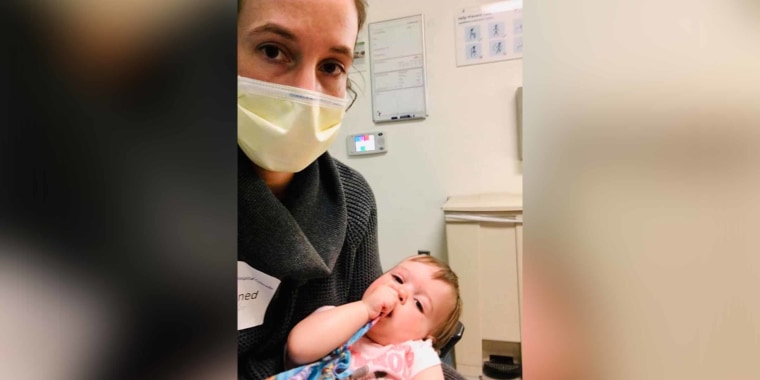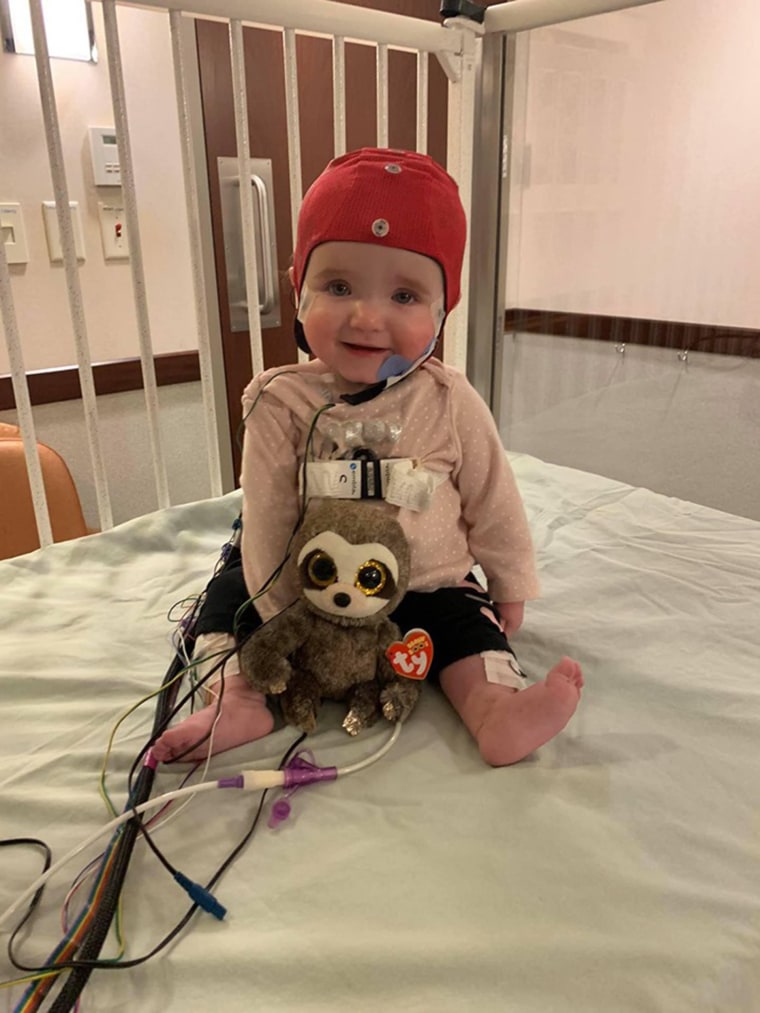The family of 1-year-old Natalie Green is one of many now tending to a child with COVID-19 and that comes with some interesting challenges. Mom, Clara Green, has to keep Natalie from being too active and away from her older brother, for example. Every time Natalie makes a noise in the middle of the night, Clara rushes to see if her toddler is breathing.
“Basically, it is comforting and soothing,” Clara Green told TODAY Parents. “It’s staying on top of the fever — even if it is a low grade one … Giving her tons of fluids. Letting her sleep all the time.”

While doctors recommend that people avoid family members sick with coronavirus, it’s nearly impossible for parents to place a sick child in a room alone to let them recover. And few parents can withhold cuddles from an ill child. How can parents care for children if they have coronavirus?
“It is a big challenge for parents because when you're caring for a child you need to be hands on,” Dr. Rosemary Olivero, division chief for infectious disease at Helen DeVos Children’s Hospital in Grand Rapids, Michigan, told TODAY Parents. “But there are things you really want to make sure you're doing.”
There’s some good news for parents though: Children who contract coronavirus experience a milder version than adults, for the most part.
“Everybody across the lifespan is susceptible to the (virus) that causes COVID-19. It is apparent it is much less severe in children than adults,” Dr. Glenn Fennelly, an infectious disease specialist and a professor of pediatrics at Rutgers New Jersey Medical School, told TODAY Parents. “It is relatively rare to get critically ill children.”
Practical isolation
Caring for a child with COVID-19 requires a little bit of planning and some dividing and conquering. If a family member is part of an at-risk group, that person should remain isolated from the child for their protection.
“If you're a person who is elderly or has a medical condition that predisposes you to more severe COVID-19, you should seek alternate caregivers for your child, and isolate yourself from them as much as possible,” Olivero said.
If possible, doctors recommend some isolation for the child with COVID-19, such as keeping a sick child and one parent to a room (if one’s house and lifestyle permit it).
“If they’re blessed enough to have a two-parent household, I usually say try to stick to just one parent who is going to be the sole person, holding, feeding and cleaning the baby,” Dr. Percy Huggins, a pediatrician at Tribeca Pediatrics, told TODAY Parents.
That way only one parent is exposed as the other parent cares for the other children and household without the rest of the family contracting it.
Alexis Stadler and her husband already practice such precautions anytime someone in their household has even the common cold. Her 1-year-old daughter, Kinsley, has two rare conditions — neurofibromatosis type 1 and hypophosphatasia — which weaken her immune system and impact her breathing.
“Whoever is sick stays in our room and the other person will stay in the living room,” Stadler, 28, of Charlotte, North Carolina, told TODAY Parents. “We have to wash our hands constantly, constantly. If I am sick, I don’t handle her.”

Dr. Patricia Whitley-Williams, chief of pediatric infectious disease at Rutgers Robert Wood Johnson Medical School, says when parents have a sick child, especially if that child has COVID-19, hand washing is essential. Parents should wash their hands constantly after contact with their child and model that good behavior for their children.
“The best protection at this point that we have against this virus is good hand washing,” she told TODAY Parents. “Teach your children how to wash their hands. Make sure they do it before they sit down to eat or … to wash your hands after they go to the bathroom.”
She also says it’s important for parents to wipe down commonly used surfaces and make sure things like tissues are thrown away immediately (with a hand washing after) to reduce the virus lurking on surfaces.
Treating the symptoms
Children experience the same symptoms as adults: cough, fever and shortness of breath. Though, kids are more likely to experience stomach upset, such as diarrhea and vomiting. The doctors agree that managing the symptoms helps provide comfort to children. So giving them acetaminophen and ibuprofen to reduce fevers is important.
“You always treat the symptoms,” Huggins said.
She also says that children can easily get dehydrated so making sure they drink enough, breastmilk, electrolytes drinks, such as sports drinks, or even water can help. If a child doesn’t have a wet diaper every six hours or less, parents should worry about hydration.
“Especially kids under 2 can get dehydrated,” Huggins said.
The experts agree that parents should call their pediatrician first to seek advice before heading to the emergency room or even the doctor's office. It’s almost impossible to tell if a child has COVID-19 without a test, but it might be wise to treat every sick person with as much care as they would someone with it.
“There is no way to differentiate between a common cold and a potential COVID-19 case,” Dr. Mike Patrick, an emergency medicine physician at Nationwide Children’s Hospital in Columbus, told TODAY Parents.
If a child struggles to breathe, parents should call 911 or make a visit to an emergency room.
“Regardless of what the cause is, you're going to want your child to be seen for that,” he said.